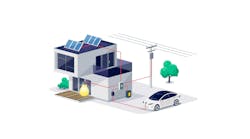Maine’s governor has signed into law a bill that boosts beneficial electrification — the electrification of technologies that would otherwise use fossil fuels — in an effort to improve efficiency, reduce carbon dioxide emissions and cut consumer costs.
Electrification of transportation and buildings is seen as a driver for microgrids, since it will increase demand for power and encourage more decentralization of energy production.
Authored by Rep. Tina Riley and signed by Gov. Janet Mills in June, HP-1071 also requires that the Maine Public Utilities issue a request for proposals (RFP) seeking pilot projects for electrifying transportation in the state.
The commission will seek projects from utilities and other entities that demonstrate load management via electric charging, direct current (DC) fast charging, fees and incentives for DC fast charging, and customer engagement and awareness programs.
Proposals will be due Feb. 1. 2020. Utilities and other entities may apply.
One two punch for beneficial electrification
Gov. Mills also signed into law a bill, LD 1766 that sets a goal to install 100,000 heat pumps in Maine by 2025. Maine uses more home heating oil per capita than any other state in the nation. Heat pumps would replace oil heat with efficient electric heat.
“Passage of the beneficial electrification bill shows that Maine is serious about its clean energy and climate goals,” said Emily Lewis ,Acadia Center’s climate and energy analysis center director. “Coupled with the heat pump market transformation bill, Maine is now poised to attack its two biggest sources of greenhouse gases – buildings and transportation.
“These bills offer a one-two punch by setting the state up for near-term progress through residential heat pump targets and pilot electric vehicle programs, while also establishing a path for long-term solutions by studying barriers to electrifying these sectors,” she told Microgrid Knowledge.
Microgrid bill delayed
A separate bill to allow for the development of microgrids that are in the public interest — LD 13 sponsored by Rep. Mick Devin — was carried over to the next legislative session.
This is the second such attempt to pass the bill to ease microgrid development. Similar legislation had been introduced last year but was vetoed by the former governor, Paul LePage, a Republican.
Microgrid supporters in Maine, citing a Stanford University study, say that microgrids are essential to maintaining reliability and to attracting 21st Century high-tech employers.
The microgrid bill would also ensure the generation of electricity by more renewable sources and by advancing energy storage to harness those electrons. It would also allow utilities to receive compensation for scheduling or shedding of electrical load to reduce peak demand.
The bill ran into opposition over concerns that microgrids would escape regulation by the public service commission and thereby hurt those utilities that provide traditional electricity service; investor-owned utilities are not permitted to own and operate microgrids. To address those objections, the legislation limits the microgrid’s load to no greater than 10 MW. The bill also requires that the power source fit into the state’s goals to supply all of its electricity with green energy.
The legislation “also gives the commission oversight to ensure reliability and security of the electrical system and consumer protections for new microgrid consumers,” the summary reads. It specifies that a new microgrid does not become a public utility as a result of its furnishing electrical service to participating consumers.
Track news about beneficial electrification efforts and what they mean to microgrids. Subscribe to the free Microgrid Knowledge newsletter.







